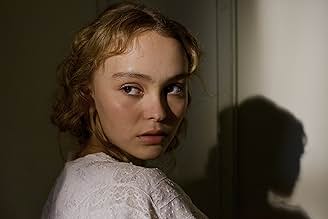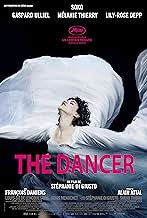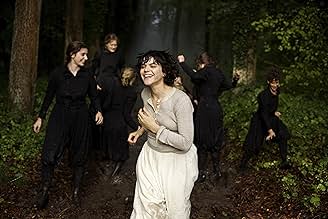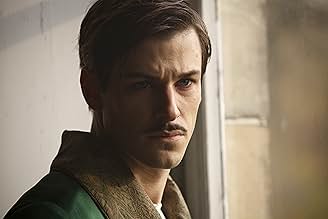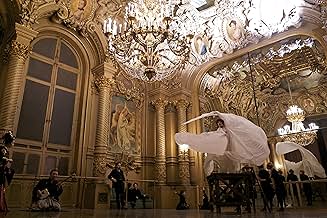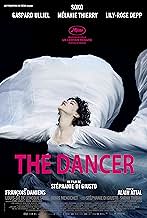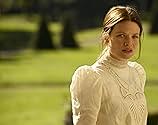IMDb RATING
6.5/10
2.9K
YOUR RATING
Loïe Fuller was the toast of the Folies Bergères at the turn of the 20th century and an inspiration for Toulouse-Lautrec and the Lumière Brothers. The film revolves around her complicated re... Read allLoïe Fuller was the toast of the Folies Bergères at the turn of the 20th century and an inspiration for Toulouse-Lautrec and the Lumière Brothers. The film revolves around her complicated relationship with protégé and rival Isadora Duncan.Loïe Fuller was the toast of the Folies Bergères at the turn of the 20th century and an inspiration for Toulouse-Lautrec and the Lumière Brothers. The film revolves around her complicated relationship with protégé and rival Isadora Duncan.
- Awards
- 1 win & 16 nominations total
William Houston
- Rud
- (as Will Houston)
Matilda Kime
- L'assistante de Louis
- (as Mathilda Kime)
Featured reviews
A very beautiful film directed with vigor and taste. To classify this film as biopic does not do justice to it and it is even misleading. I read so many ill directed criticism on what is and what is not historically accurate in the movie. Who cares? Who would criticize the Greek poet Kavafy for misrepresenting historical figures in his poems? For me 'The Dancer' is a poetic film on beauty and the passion for creativity and it was a pleasure to watch. For two hours I was immersed in the film's world, relishing every bit of it; the elliptical decor, the unreal almost lighting, the spectacular dance, the energy. Indeed what I liked most was the fact that the film did not make an effort to faithfully reconstruct an era, but rather create its own unique universe combining various elements in a coherent whole. Let alone the amazing amount of work that went into it, the production design, the choreography, the music. The audacious directorial approach is justified by the result. Soko's choice to play Loie Fuller was excellent as she brought into the part her own fierce determination to develop in the show and music business matched with confident and truthful acting. The film is an amazing feat anyway, but even more so as a debut feature.
The body as art is not hinted, it's the piece. This indulgence in the sensual somehow does not invite perversion. The effect is it's wholly performance authorial, a complete integration of performer and role, which happens just once in a blue moon. She almost dies each time, like a birth effect, same time it brings a cinema of transcendence. And maybe the french would roll their eyes and say, can't believe he fell for our tricks. That she's bringing the effect of the bad girl. But it sees no difference between her, her dance, the cinema. The film could be science fiction, like she is some techno-bird, cranking the levers, the lights, the darkness she emerges under spotlight, her dance like a ritual for the space gods; it's all very steampunk, but where here the era of industrialism begins for great mechanizations to streamline and integrate, so too would be art by the same process, to the same ends but in the way of the ecstatic truth. I'm envious because who ever gets so actualized? You have talents and presences and great ones but rare to actualize within a piece, to see one so wholly expressed where it feels like some endpoint. I sense Soko inspires that like some cinema muse. It's hard to talk about it rationally, same as dance.
Historians have a way of sterilising cinema. So many words are wasted on whether a film is accurate instead of understanding and enjoying film as an artform. The Dancer (2016) is a bio-pic based on the life of Loíe Fuller who pioneered a hybrid dance performance that integrated visual spectacle and physical movement. Historians can fuss over facts, but others will enjoy what is an aesthetically intense story of creative innovation in late 19th Century Paris.
The story opens with Loíe (Soko) raised by her drunken father on a farm in America. A keen reader with a vivid imagination, she dreams of a career as an actress. After her father dies, she uses money stolen from a would-be seducer to cross the Atlantic in search of fame. She stumbles upon a Parisian theatre looking for a performer to fill the stage during interval. As a talented artist with an eye for design, she conceives of a dance act that disguises her modest dancing talent and creates a dramatic serpentine performance using a costume of batons and swirling bedsheets. Her act is immediately popular. Although physically arduous, the performance evolves to using silk, coloured lights, and dramatic music, and suddenly Loíe is the toast of Paris. When the talented teenage dancer Isadora Duncan (Lilly_Rose Depp) joins the troupe, the stress of dancing on Loíe's body, her penchant to overspend, and her emerging sexual ambivalence, all begin to take their toll.
This is a luscious film to watch. Its rich colour palette, top-shelf production values and unconventional characterisations create the dramatic energy which drives the narrative. Undoubtedly, it is Soko's physicality and her acting style that makes this film work. She has an almost androgynous beauty that the camera exploits; in some scenes she appears dashingly handsome, in others, sublimely feminine. With an emotive range that switches effortlessly from ingénue to sophisticate, she transfixes with her gender-free expressiveness, even under the on- screen competitive pressure of the beautiful young Isadora. The serpentine dance performances are mesmerising. They hang in a space somewhere between classical ballet, modern jazz, and a gyrating living sculpture draped in wings of silk accompanied by Vivaldi under spotlights. It's easy to understand their immense popularity as a dramatic innovation in stage performance. Above all else, The Dancer captures this spirit of excitement.
Reading this film as history gets in the way of enjoying it as visual spectacle and engaging narrative. Loíe Fuller was praised by luminaries of her time, such as Yeats, Toulouse-Lautrec, and Rodin, but largely forgotten in her native country. The Dancer is a tribute to an avant-garde artiste whose legacy lives on in theatrical dance effects that have become an artform in their own right.
The story opens with Loíe (Soko) raised by her drunken father on a farm in America. A keen reader with a vivid imagination, she dreams of a career as an actress. After her father dies, she uses money stolen from a would-be seducer to cross the Atlantic in search of fame. She stumbles upon a Parisian theatre looking for a performer to fill the stage during interval. As a talented artist with an eye for design, she conceives of a dance act that disguises her modest dancing talent and creates a dramatic serpentine performance using a costume of batons and swirling bedsheets. Her act is immediately popular. Although physically arduous, the performance evolves to using silk, coloured lights, and dramatic music, and suddenly Loíe is the toast of Paris. When the talented teenage dancer Isadora Duncan (Lilly_Rose Depp) joins the troupe, the stress of dancing on Loíe's body, her penchant to overspend, and her emerging sexual ambivalence, all begin to take their toll.
This is a luscious film to watch. Its rich colour palette, top-shelf production values and unconventional characterisations create the dramatic energy which drives the narrative. Undoubtedly, it is Soko's physicality and her acting style that makes this film work. She has an almost androgynous beauty that the camera exploits; in some scenes she appears dashingly handsome, in others, sublimely feminine. With an emotive range that switches effortlessly from ingénue to sophisticate, she transfixes with her gender-free expressiveness, even under the on- screen competitive pressure of the beautiful young Isadora. The serpentine dance performances are mesmerising. They hang in a space somewhere between classical ballet, modern jazz, and a gyrating living sculpture draped in wings of silk accompanied by Vivaldi under spotlights. It's easy to understand their immense popularity as a dramatic innovation in stage performance. Above all else, The Dancer captures this spirit of excitement.
Reading this film as history gets in the way of enjoying it as visual spectacle and engaging narrative. Loíe Fuller was praised by luminaries of her time, such as Yeats, Toulouse-Lautrec, and Rodin, but largely forgotten in her native country. The Dancer is a tribute to an avant-garde artiste whose legacy lives on in theatrical dance effects that have become an artform in their own right.
For the last several decades, we have had movies showing us the grime behind the apparently beautiful world of the dance. This is another in that by now too long series, one that has nothing new to add. We see lots of ugly backstage scenes, and then, very rarely, a glimpse of the beauty of a Fuller performance.
Part of that is because, if one were to judge from this movie, Fuller was very much a one-trick pony. She was not, in any significant sense, a dancer. Rather, she was a show woman who figured out how to use lighting and mirrors to create a beautiful, magical effect as she twirled around waving robes extended on bamboo batons.
In fact, however, the real Loie Fuller was a fascinating and very versatile woman involved in developing new lighting techniques and all sorts of other things to improve stage performance. This movie VERY much shortchanges her, and should not in any way be taken as a biopic. Why a woman director would reduce an evidently very intelligent and interesting woman to a pouting bundle of uncontrolled emotions I do not know.
If you were to believe this movie - and you shouldn't - there really wasn't much to Fuller's art. Nothing like ballet, or modern dance, or jazz dancing, or ... Just twirling around, waving her robes, while different colored lights and background mirrors enhanced the effect.
So we are left with her life. If it was at all as it is presented in the movie, and there is no reason to assume that that was the case, it was pretty miserable. We see that she spends lots of time building up her shoulder muscles so she can keep waving those robes, with the result that her arms often hurt. The light from the colored light hurts her eyes. She ends up in several confusing and bad relationships. A rough life, in other words. But the movie does nothing to make us care.
This movie needed a MUCH better script to make us understand and sympathize with Fuller. Otherwise, except for the few moments when she goes into her dance, it's just a lot of uncontrolled emotions that we have no reason to care about. It seems a real shame to have reduced what was evidently a very interesting and intelligent woman to a bundle of uninteresting emotions.
Part of that is because, if one were to judge from this movie, Fuller was very much a one-trick pony. She was not, in any significant sense, a dancer. Rather, she was a show woman who figured out how to use lighting and mirrors to create a beautiful, magical effect as she twirled around waving robes extended on bamboo batons.
In fact, however, the real Loie Fuller was a fascinating and very versatile woman involved in developing new lighting techniques and all sorts of other things to improve stage performance. This movie VERY much shortchanges her, and should not in any way be taken as a biopic. Why a woman director would reduce an evidently very intelligent and interesting woman to a pouting bundle of uncontrolled emotions I do not know.
If you were to believe this movie - and you shouldn't - there really wasn't much to Fuller's art. Nothing like ballet, or modern dance, or jazz dancing, or ... Just twirling around, waving her robes, while different colored lights and background mirrors enhanced the effect.
So we are left with her life. If it was at all as it is presented in the movie, and there is no reason to assume that that was the case, it was pretty miserable. We see that she spends lots of time building up her shoulder muscles so she can keep waving those robes, with the result that her arms often hurt. The light from the colored light hurts her eyes. She ends up in several confusing and bad relationships. A rough life, in other words. But the movie does nothing to make us care.
This movie needed a MUCH better script to make us understand and sympathize with Fuller. Otherwise, except for the few moments when she goes into her dance, it's just a lot of uncontrolled emotions that we have no reason to care about. It seems a real shame to have reduced what was evidently a very interesting and intelligent woman to a bundle of uninteresting emotions.
The Good: the wonderful costumes, the stunning dance routines, and the performance of Soki in the lead role. Purely as a spectacle, there's plenty to enjoy.
The Bad: the storyline was completely disjointed. Certain scenes and interactions made no sense, suddenly following on from one another in a jarring way. There seemed to be gaps (scenes edited out for length?). It was hard to tell how much time was supposed to have elapsed. The way Soki meets Gabrielle in a car park, and then next scene she's suddenly got some huge show happening: it was bewildering.
Let's not even get started on the confusing relationships. I'm not sure what I was supposed to be watching there, or who was already supposed to have slept with whom.
Ultimately this would have been a better film if they had cut down on the endless scenes of Soki's pain and exercise and bleeding eyes and ice baths, and added a bit more storytelling. Much of the US/ New York stuff could have been cut/tightened (particularly since it wasn't biographically accurate, and served minimal apparent purpose. Save for Ulliel, the NY cast didn't reappear once we moved to Paris).
The Bad: the storyline was completely disjointed. Certain scenes and interactions made no sense, suddenly following on from one another in a jarring way. There seemed to be gaps (scenes edited out for length?). It was hard to tell how much time was supposed to have elapsed. The way Soki meets Gabrielle in a car park, and then next scene she's suddenly got some huge show happening: it was bewildering.
Let's not even get started on the confusing relationships. I'm not sure what I was supposed to be watching there, or who was already supposed to have slept with whom.
Ultimately this would have been a better film if they had cut down on the endless scenes of Soki's pain and exercise and bleeding eyes and ice baths, and added a bit more storytelling. Much of the US/ New York stuff could have been cut/tightened (particularly since it wasn't biographically accurate, and served minimal apparent purpose. Save for Ulliel, the NY cast didn't reappear once we moved to Paris).
Did you know
- TriviaElle Fanning was first attached to play Isadora Duncan, but was later replaced by Lily-Rose Depp.
- GoofsLoie first performed at the Follies Bergere in the early 1890s, but the director of the Follies Bergere is driving an "olde tymey" car from perhaps 2 decades later when Loie ambushes him in his carpark in order to present an impromptu audition.
- SoundtracksDestined For Great Things
Composed by Nick Cave and Warren Ellis
Performed by Nick Cave and Warren Ellis
- How long is The Dancer?Powered by Alexa
Details
- Release date
- Countries of origin
- Official sites
- Languages
- Also known as
- The Dancer
- Filming locations
- Opéra de Vichy, 1 rue du Casino, Vichy, Allier, France(scenes in the American theatre)
- Production companies
- See more company credits at IMDbPro
Box office
- Gross worldwide
- $1,960,510
- Runtime
- 1h 48m(108 min)
- Color
- Sound mix
- Aspect ratio
- 2.39 : 1
Contribute to this page
Suggest an edit or add missing content

